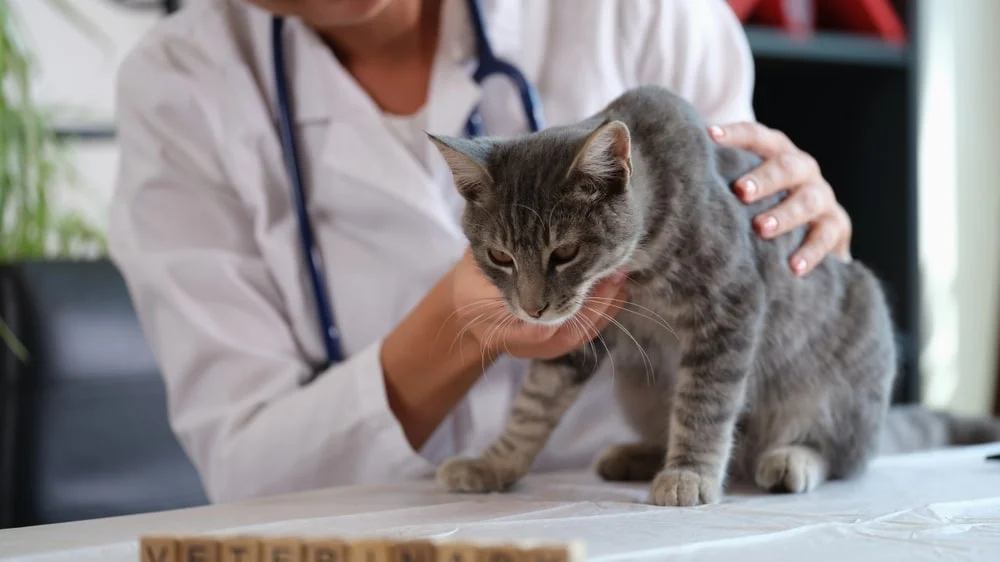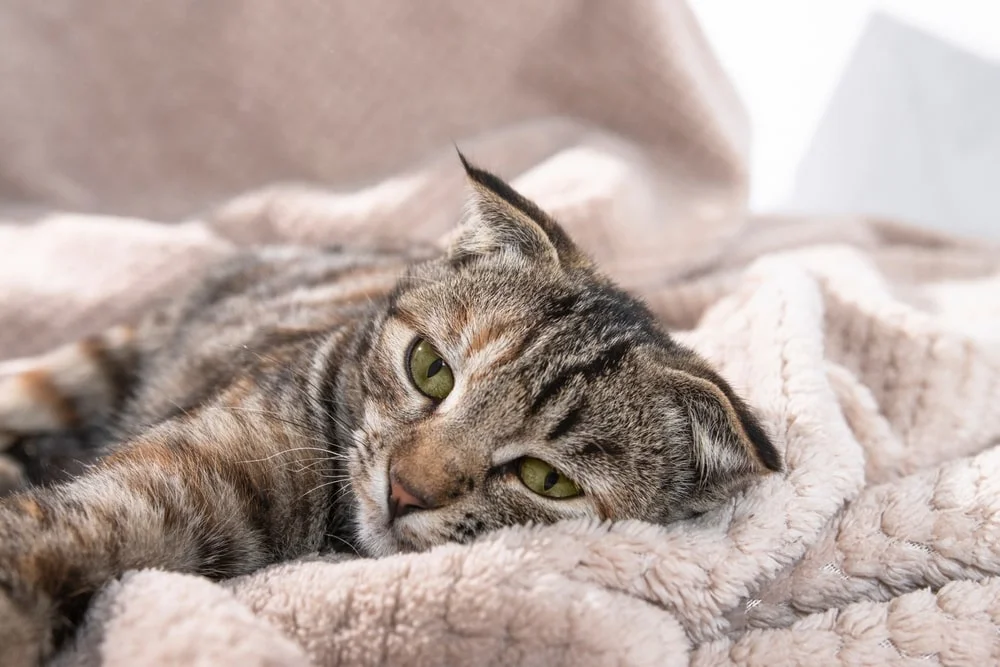PET HEALTH
Let’s face it: Cats love getting up to mischief. But sometimes, that mischief can turn into real trouble — especially if your cat ate something they shouldn’t have! We can’t always keep our kitties out of trouble, which is why it’s so important to know how to handle an emergency. Read on to learn what to do when your cat eats one of these common household items.
Signs My Cat Ate Something Bad
When a cat feels sick, they often keep it to themselves. That’s why it’s so important to pay close attention to their behavior. If you notice any of these symptoms, as listed by the Pet Poison Helpline, it could be a sign that they’ve eaten something bad for them:1
- Vomiting
- Diarrhea
- Drooling
- Lack of appetite
- Increased thirst and urination
- Swelling
- Lethargy
- Jaundice
- Fever
- Tremors
- Seizure
- Shock
- Collapse
- Coma
- Irregular heartbeat
Not all of these symptoms may be evident as soon as your cat eats something toxic, and not every toxic substance will result in all of them. Also, it’s always possible that your cat will react differently, depending on factors like their size and how much of the toxic item they ate.
How to prepare
Prevention is the best way to prepare for emergencies. Take steps to keep toxic substances and potentially dangerous materials away from your cat, and never leave them alone with an item they may accidentally swallow.
You should also put together a first aid kit for your cat, including supplies like:2
- Digital thermometer
- Gauze roll
- Clean towels
- Non-stick bandages
- Self-adhering tape and non-stick tape
- Blunt scissors to cut bandages
- Disposable gloves
- A penlight or small flashlight to examine your cat’s eyes and/or throat
- Tweezers
- Eye droppers to administer oral medicine or flush wounds with saline
- Activated charcoal for absorbing toxins
- Sterile lubricating jelly
- 3% hydrogen peroxide to induce vomiting
- Do NOT induce vomiting without first consulting your vet or pet poison hotline
You should also have important phone numbers saved, including:
- Animal Poison Control Center: (888) 426-4435
- Pet Poison Helpline: (855) 764-7661
Also, keep the number for the nearest emergency vet hospital saved somewhere safe.
A MetLife Pet Policy Can Cover Emergency Vet Costs
My Cat Ate Chocolate
Chocolate is just as dangerous for kitties as it is for dogs. In some cases, it can be even more dangerous for a cat, since they’re usually smaller than most dogs. The best way to prevent chocolate poisoning is to keep chocolate out of your cat’s reach. This can be easier said than done, given how curious cats can be. Store your chocolate on a high-up shelf and in a container that feline paws can’t easily open.
Chocolate poisoning can cause many of the symptoms listed above, including vomiting, diarrhea, increased thirst, and panting. If you notice these signs and suspect your cat ate chocolate, contact your emergency vet, as well as the Pet Poison Helpline at (855) 764-7661. If you can, have the following information ready, as it may help your vet determine the next course of action:1
- The specific type of chocolate
- The amount ingested
- When you think ingestion may have happened
- Symptoms you’ve noticed
Once at the vet or emergency hospital, they’ll likely try to induce vomiting to purge the toxins. Fluids and medication may also be given to treat the symptoms and help your kitty recover.
My Cat Ate String
Many cats love playing with string, which can all too easily lead to them swallowing said string. Although it may seem harmless, swallowing any foreign object can cause complications. The most common result is creating an obstruction in your cat’s digestive tract. Obstructions can lead to everything from a choking hazard to swelling of the stomach and intestines. In some cases, the string could even puncture your cat’s stomach or intestinal lining.2
The best way to prevent this is to keep strings away from your cat, but accidents can happen. If you suspect your cat ate yarn or a string, watch out for lack of appetite and increased vomiting, as well as a swollen stomach and restless behavior.4 Your vet can determine conclusively if a swallowed string is to blame, usually with an X-ray and ultrasound. Treatment may involve an endoscopy to remove the string or surgery if it’s a severe case.
My Cat Ate Plastic
Plastic is everywhere, and it also happens to be something many cats enjoy chewing on. If you’ve noticed your kitty gnawing on plastic items, know that they’re at risk of swallowing some of the material. Although cats will sometimes vomit or pass the plastic pieces on their own, bigger pieces can be a choking hazard or become stuck in their digestive tract. If your cat ate plastic, it’s best to bring them to the vet immediately. They can determine how large the swallowed plastic piece is and whether surgery is required to remove it.
Immediate action may be required if you find your cat choking on a piece of plastic. The best way to prepare for such an event is by taking a pet first aid class. You’ll learn how to perform the Heimlich maneuver on your pet and safely remove items from your pet’s throat, among other potentially life-saving techniques.
My Cat Ate a Bee
Have you ever noticed your cat hunting a bug that’s made its way into your home? This can be a good way for them to exercise their hunting skills. If your cat ate a fly or a bee, they likely won’t have trouble digesting it. But it could expose your kitty to certain parasites, including hookworm, heartworm, and tapeworms.3
Hunting bees also comes with the risk of being stung. A bee sting can cause painful swelling or worse if your cat has an allergic reaction. The best way to protect your cat is to remove bees and other dangerous insects before your cat can come into contact with them. If your cat gets stung, bring them to the vet for assessment and treatment.
My Cat Ate Raw Chicken
Raw chicken isn’t necessarily going to cause problems for your cat. In fact, cats are much better at digesting raw meat than humans. Still, raw chicken on its own isn’t going to be a nutritious option for your cat. It also poses risks like salmonella and parasites, and it may contain bones that could harm your cat’s throat, stomach, or cause choking.1
If your cat ate raw chicken, watch them for vomiting, diarrhea, lethargy, and low appetite. These could indicate an infection, which could become life-threatening if not treated. Prevent raw meat consumption by keeping your kitchen area clean and immediately picking up any dropped bits of chicken.
My Cat Ate Lily Plants
Lilies are one of the many common household plants that are highly dangerous when ingested by cats. In fact, consuming any part of a lily — from the petals to the stem and even the pollen — can cause your cat to develop kidney failure in as little as 3 days.2 Early signs of lily poisoning include:
- Lethargy
- Drooling
- Decreased appetite
- Vomiting
Kidney damage begins within 12 – 24 hours following ingestion, identifiable by increased urination along with the above symptoms. If lily poisoning isn’t treated within 24 – 72 hours, your cat will develop complete kidney failure.7
The sooner your cat receives treatment, the better their odds of recovery. Bring your cat to the vet the moment you suspect they’ve consumed a lily plant. If not treated within 18 hours, the damage could be irreversible.7
The best way to protect your cat from lily poisoning? Don’t keep the plant in your home. Even if it’s beyond your cat’s reach, stray bits of pollen are enough to put them in serious danger.
My Cat Ate Ibuprofen
Ibuprofen may be helpful when it comes to treating aches and pains in humans, but it can be extremely harmful for cats. Consumption of any nonsteroidal anti-inflammatory drug, including ibuprofen, will damage your cat’s kidneys and liver by blocking the chemical processes involved in blood clotting and other normal liver, kidney, and gastrointestinal functions. Keep an eye out for symptoms, including:3
- Decreased appetite
- Blood in vomit
- Diarrhea or dark, tarry stools
- Blood in stool
- Lethargy
- Depression
- Pale gums
- Increased water consumption
- Decreased urination
- Jaundice
- Lack of coordination
- Agitation
- Tremors and seizures
- Coma
Any of these signs is reason enough to bring your cat to the vet. Bloodwork may be used to reach a conclusive diagnosis, after which your vet will determine the best course of treatment. If it’s only been a few hours, your vet might want to induce vomiting to try and purge the ibuprofen. Active charcoal can then be used to prevent absorption of the drug in the intestines. Additional drugs may be administered to help manage poisoning symptoms.8
If your cat’s case is particularly severe, they may need to be hospitalized. You might also need to monitor your cat for liver or kidney damage even after they’ve been sent home.8
Vet Bills Can Be Hard To Digest. MetLife Pet Insurance Can Help
For us cat lovers, few things bring as much joy to our lives as our feline friends. There are few steps we wouldn’t take to keep them safe. An important protective measure can be buying a cat insurance plan. Learn more about the full value of pet insurance. Then, take the first step by getting a free pet insurance quote today.
We Can Help You Protect Your Cat



